We’re on a mission to share what travel is really like in the countries that we’re trippin’ through–and that includes sharing the bad along with the good. We admit it: we didn’t like traveling in Xinjiang, China. Here’s why.
If you’re traveling to Xingjiang, or anywhere in China for that matter, make sure to get a VPN before you go. We used and recommend ExpressVPN when you travel to China. Check out ExpressVPN here for the best deals.
We left western China after only three weeks of travel.
The original plan was to travel around western and central China for two or three months. We’d enter from Pakistan, kick it in Xinjiang for a bit, get as close to Tibet as possible without having to get permits or be arrested, then exit through to Kyrgyzstan. We entered with high hopes, excited to explore a country that is so saturated with ancient history it’s fit to burst, that has a culture completely unlike any other in this world.
As the days progressed, we realized our expectations were too high. The China we imagined was far, far to the east, and Xinjiang province was more of a tense territory taken from other countries, rather than a true extension of China. Our days turned into drags, and we spent more time being frustrated, bored, and whinging about lost funds than actually enjoying ourselves.
Where’s the fun in that?

Hiding out in a hostel because sights are beyond our budget.
There was no point in forcing ourselves to enjoy something we found mediocre when so many other places were calling our names. We decided to throw in the towel on China for now, and save it for another day when we have more time, less of a Central Asian agenda, and have acquired several million dollars via a lottery/inheritance from mysterious distant relatives/getting a sugar momma or daddy.
Until that magical moment when we become millionaires (sugar daddies, take note) we’ll stick to blogging. And what kind of bloggers would we be if we left you hanging with a vague “we peaced out because it sucked”?
Please.
We’re not the kind of travel bloggers that spout lies to convince you of our “perfect” lives—we’re here to keep it real. Here are a few more reasons we didn’t like traveling in Xinjiang, China. Keep in mind while reading that these views aren’t necessarily true for all of China–this is just us venting about Xinjiang itself.
Traveling to Xinjiang from Kyrgyzstan? Check out this post on crossing the border between Kyrgyzstan and China!
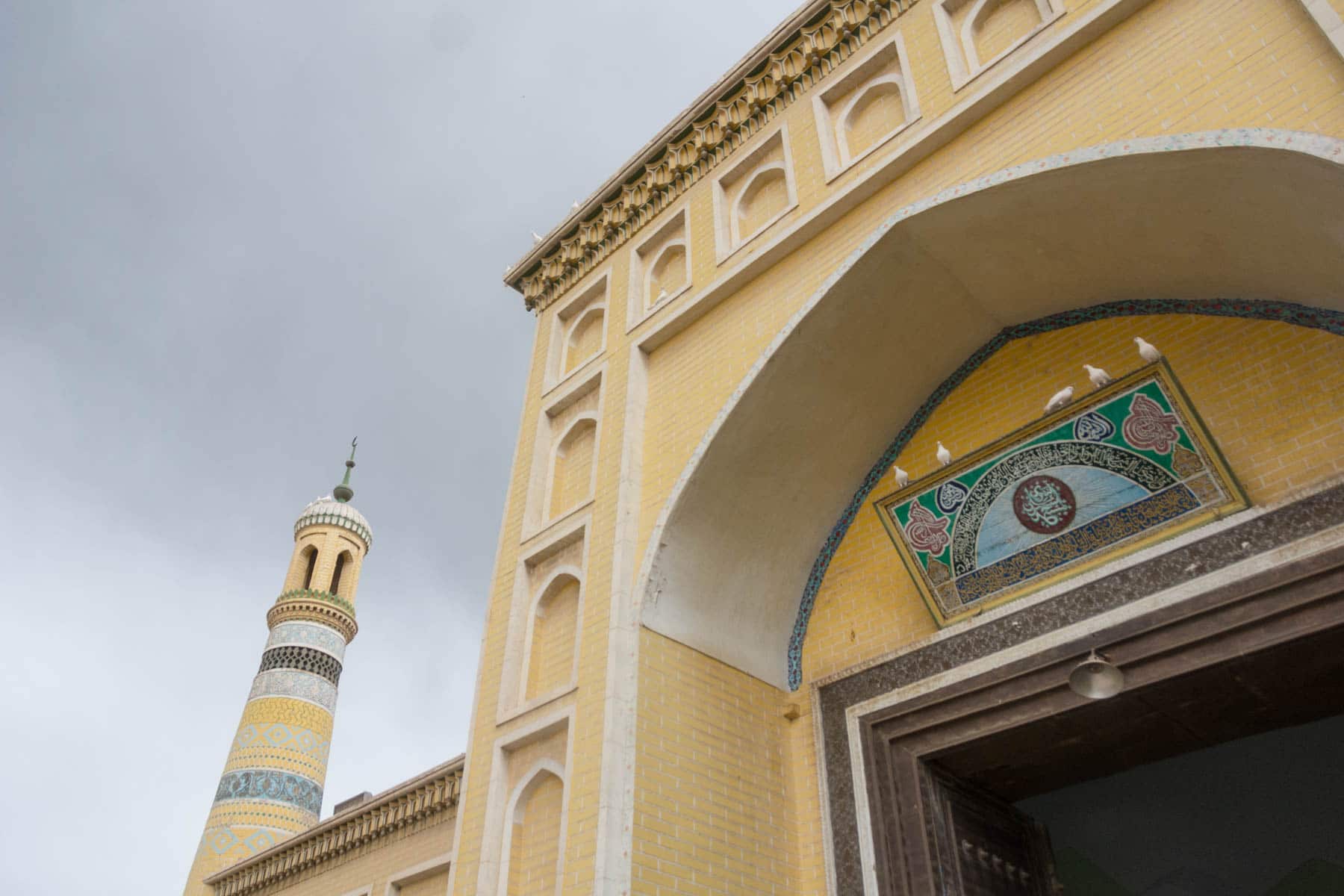
Despite being a functioning mosque, the Id Kah mosque in Kashgar entrance fee was equivalent to one night of sleeping.
Money in Xinjiang
The Chinese government loves money. They love it so much, they’ll charge you up the wazoo for everything and anything. And I mean everything.
Oh you want to see this purposeless little building? That’s 45 RMB ($6.50) please. An active mosque? 70 RMB ($10). This lovely mountain lake? That’ll be 200 RMB ($28.50).
We don’t mind spending a bit of money on sights, but when you have to empty your pockets for literally every single pointless pebble, we draw the line.
Add in the facts that a train to anywhere costs more than our daily budget, a bed in a dorm costs the same as a three-star hotel in Georgia, and active religious sights actually cost money unlike the million and one epic religious sights in Armenia, and you begin to see why western China wasn’t our flavor of the day.
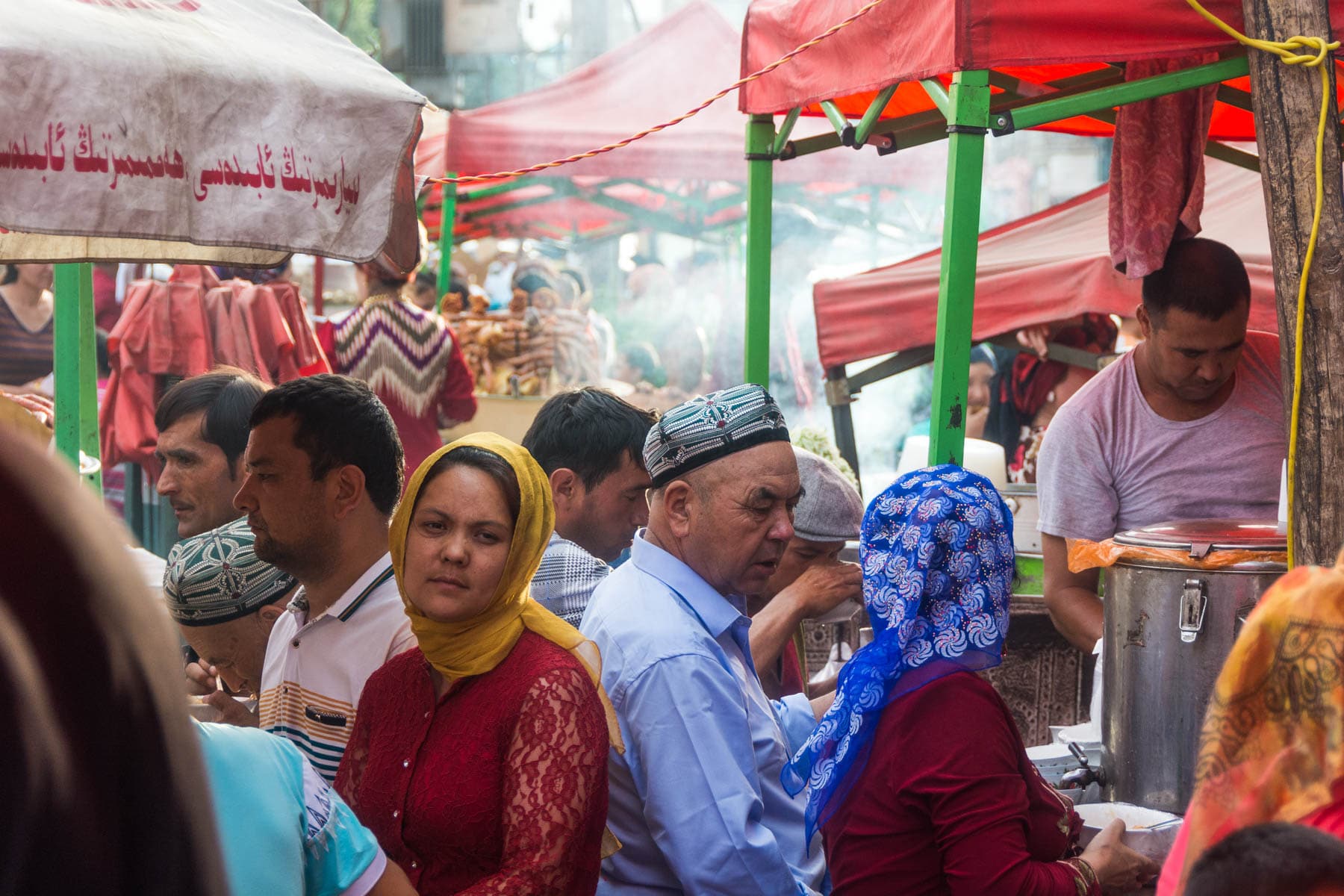
No love, only stares.
People in Xinjiang
We never felt particularly welcome when traveling in Xinjiang. People’s attitudes ranged from indifferent to downright hostile. The most common response we got when we asked people on the street a question was meiyo!–no, not possible–and a wave of the hand. Begone foreigner! You’re not wanted here. Just give us your money and leave.
Rumor has it that the local Uyghur population is usually very kind, but our experience was different. We never felt particularly welcome walking around Uyghur neighborhoods. In the true old town of Kashgar, no one would respond to our greetings.
People in Tuyoq Valley refused us entry into streets and shrines with cold stares. When hunting for lunch options in Kuche, people just glared at us as we moved towards places to sit, not turning around until we had grown uncomfortable and moved on.
It might be a side-effect of the suppression of Uyghur culture and people at the hands of the Chinese government – which has only gotten worse since we left – or perhaps we’re just scary lookin’ folks. Who knows? Everyone has their own experience, so yours may be different from ours.
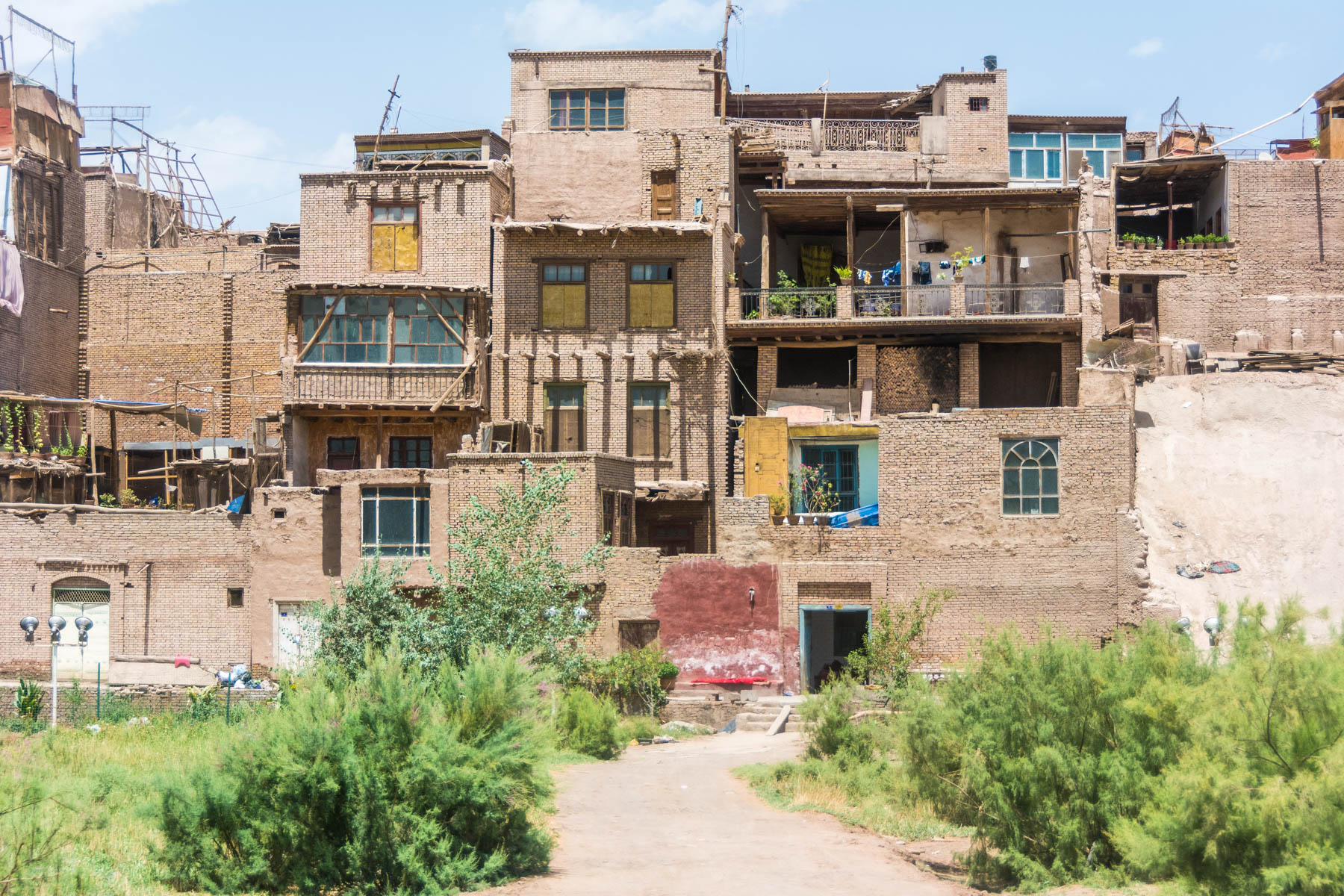
The last remnants of the old Old Town of Kashgar, the rest of which has been demolished in favor of a new, more polished “Old” Town.
The Disneyfication of tourism in Xinjiang
China seems hell-bent on destroying its sights. The process for developing tourist sights in the west seems to be:
- Realize something is worthy of tourist visits.
- Build a hideous 5-star hotel right next to it.
- Demolish any authentic buildings around it, and rebuild new ones made to look old.
- Construct a huge fence in a 10km radius around the sight.
- Set up a mandatory bus line from the fence to the entrance of the sight. Charge people 100RMB to ride the mandatory bus.
- Require tourists to have a guide. Make foreigners’ lives a bit worse by making the English-speaking guide 5 times as expensive.
- Install a million CCTV cameras to track tourists’ every movement.
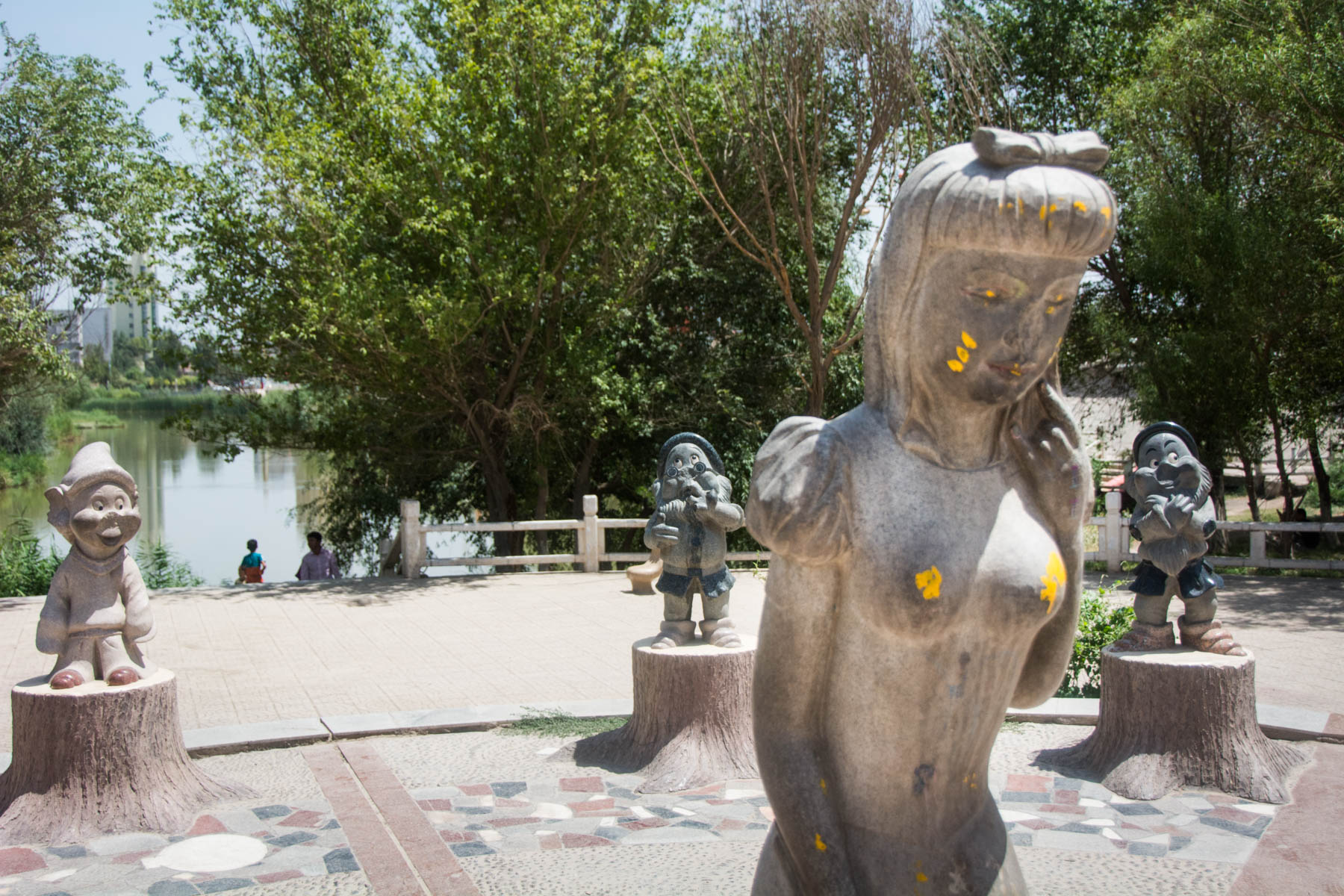
And this being China, some literal Disneyfication as well.
In addition to the charmingly Chinese development process, there’s also the issue of the way the historical sights are presented. Most of Xinjiang, the “far west” of China, is basically land that China laid claim to in recent history. The museums and sights are filled with propaganda, re-crafting Uyghur history and culture to fit the Chinese government’s seemingly happier (and more Chinese) narrative. Xinjiang? Xinjiang is China and has always been China. Uyghurs? No, they are simply Chinese… with a slightly different ethnic background that we will choose to ignore.
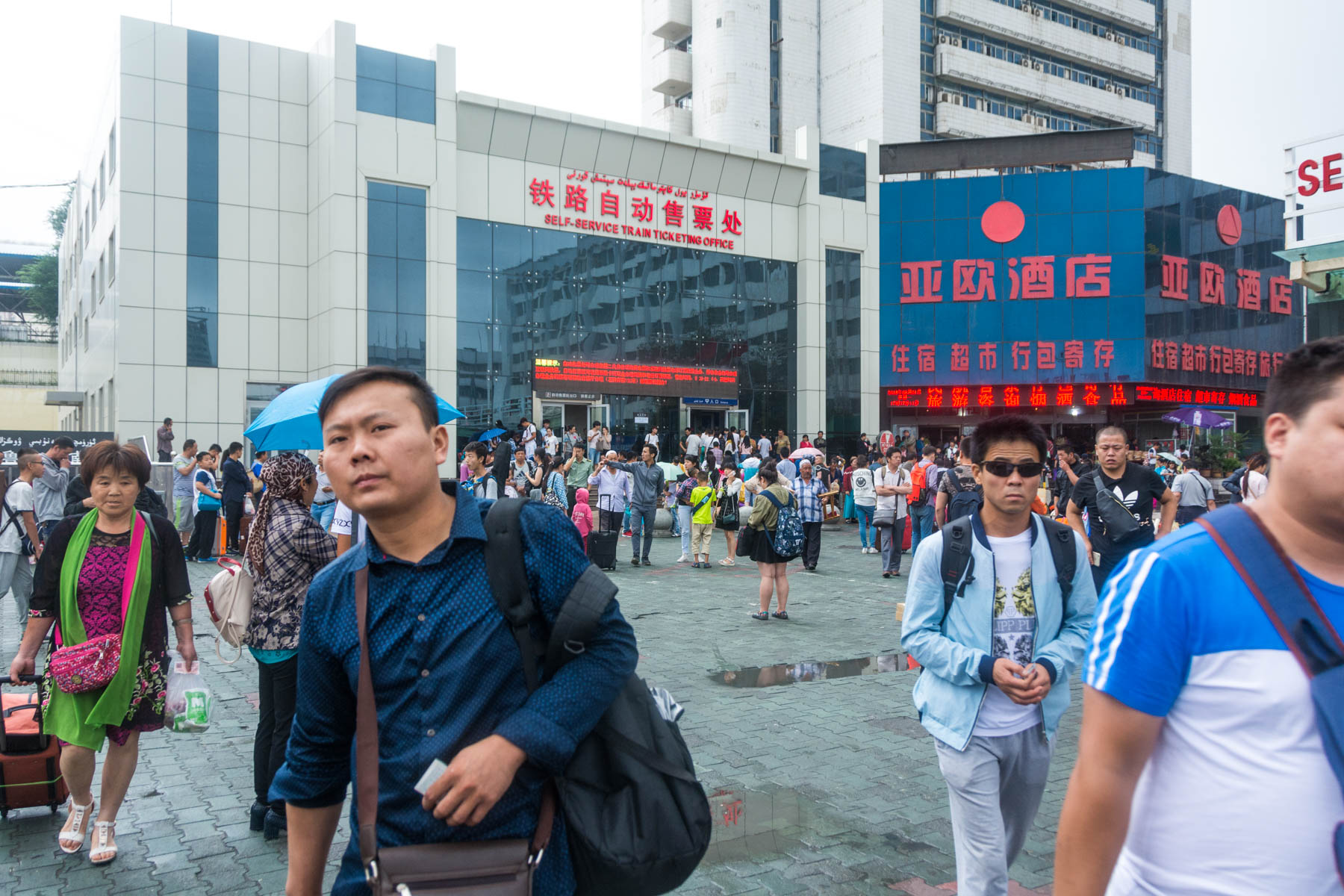
Local folks waiting to go to the three–yes, three–security checkpoints to enter the train station in Urumqi.
Chinese officials are mindless drones
What’s the most deadly article you’ve carried on you while traveling?
For us, it’s deodorant.
Forget the pocket knives, toxic bug spray, and baton-like selfie stick–the ever-so-clever Chinese security deduced that spray deodorant was our weapon of choice. Multiple cans of our deodorant were confiscated because ??? We might kill someone with freshness? Craft a bomb with our B.O.-begone? Do I look like fucking MacGyver to you?!
China doesn’t want citizens to be independent, self-thinking, or critical–it would be dangerous for the Party. Instead, it has created an army of mindless security drones who refuse to do anything except following paper orders to a T. And these totally arbitrary security restrictions drove us insane. Even more so than security in Pakistan (and that’s sayin’ something).
Paper says no drinks on the bus platform, so no drinks on the bus platform. The fact that it’s 40 degrees and you’re on the verge of dying from dehydration is irrelevant–the paper has spoken. The fact that there’s a vending machine for drinks on the platform is also irrelevant–you still cannot have drinks there.
Paper says no suspicious objects on the bus. You have shampoo in your backpack. Your shampoo is very suspicious, despite the fact that it is in a bag with conditioner, razors, soap, and other shower products. Suspicious objects are not allowed on the bus, so you are not allowed on the bus.
Paper says groups are not allowed to intermingle at the border. You must stand by your bus, and stop speaking to the person in line before you. Shouted conversations across the compound to said person are acceptable, however–the paper says nothing about that.
Before the rant ends: a caveat about traveling in Xinjiang
Traveling isn’t always going to be fun, and it’s easy to get sucked into a negative mindset. It’s important to remember that traveling is a privilege not granted to many, and we should be fortunate for what we do have, even if it is really fucking annoying frustrating at times.
So let’s end this on a positive note, shall we? Despite the frustrations and pains, there was one shining beacon of excellence throughout our time in Xinjiang: the food.
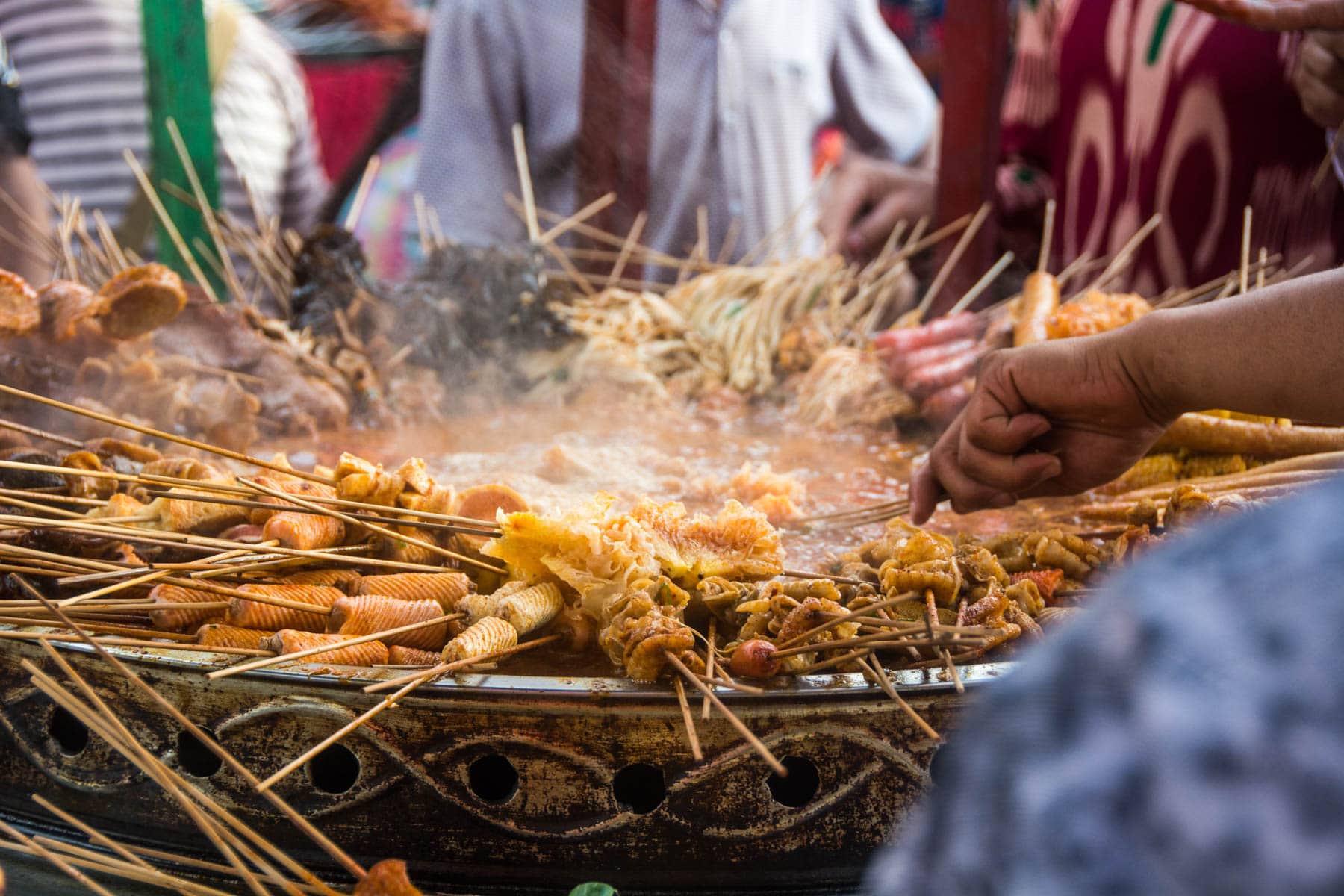
Yes.
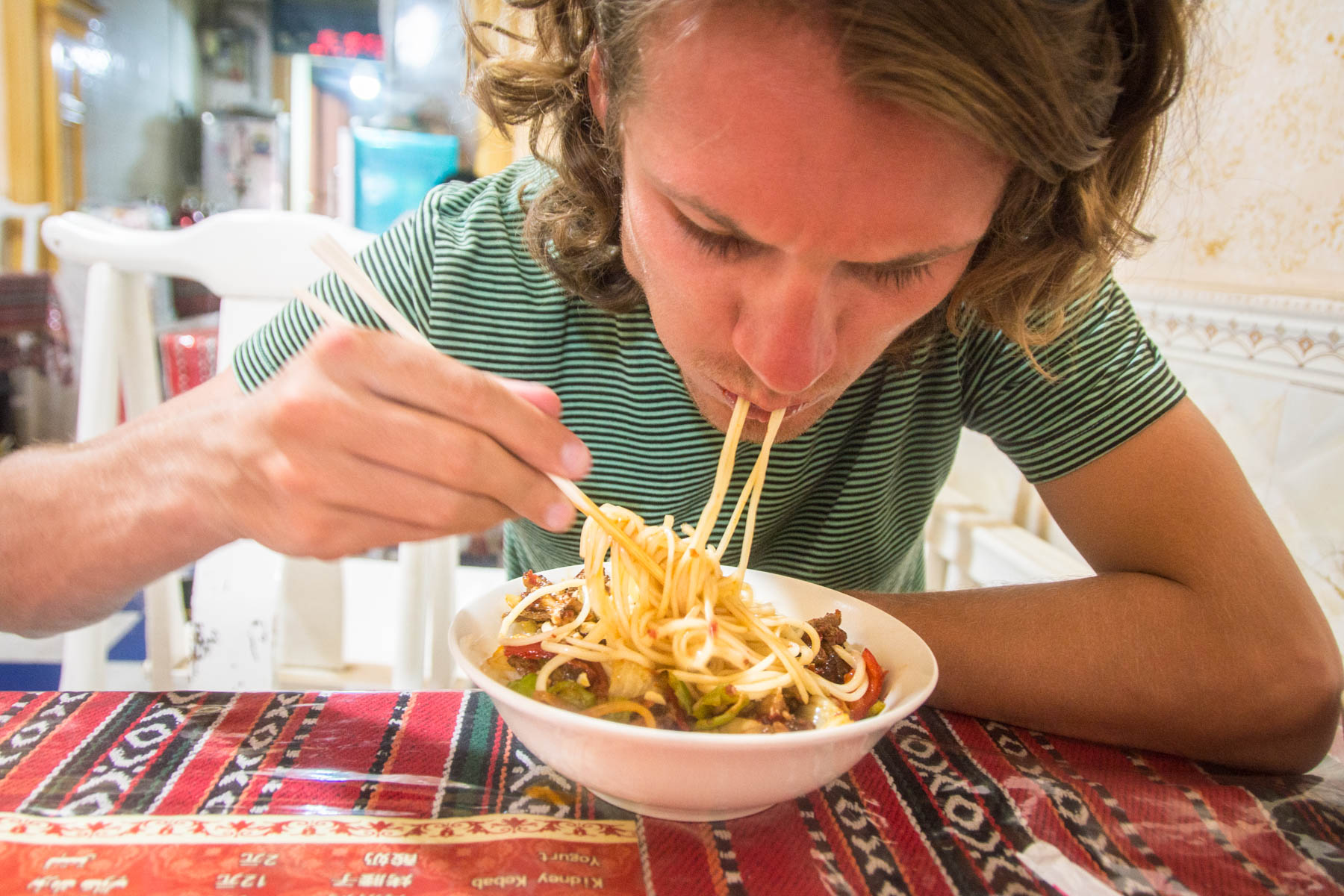
Oh yes.
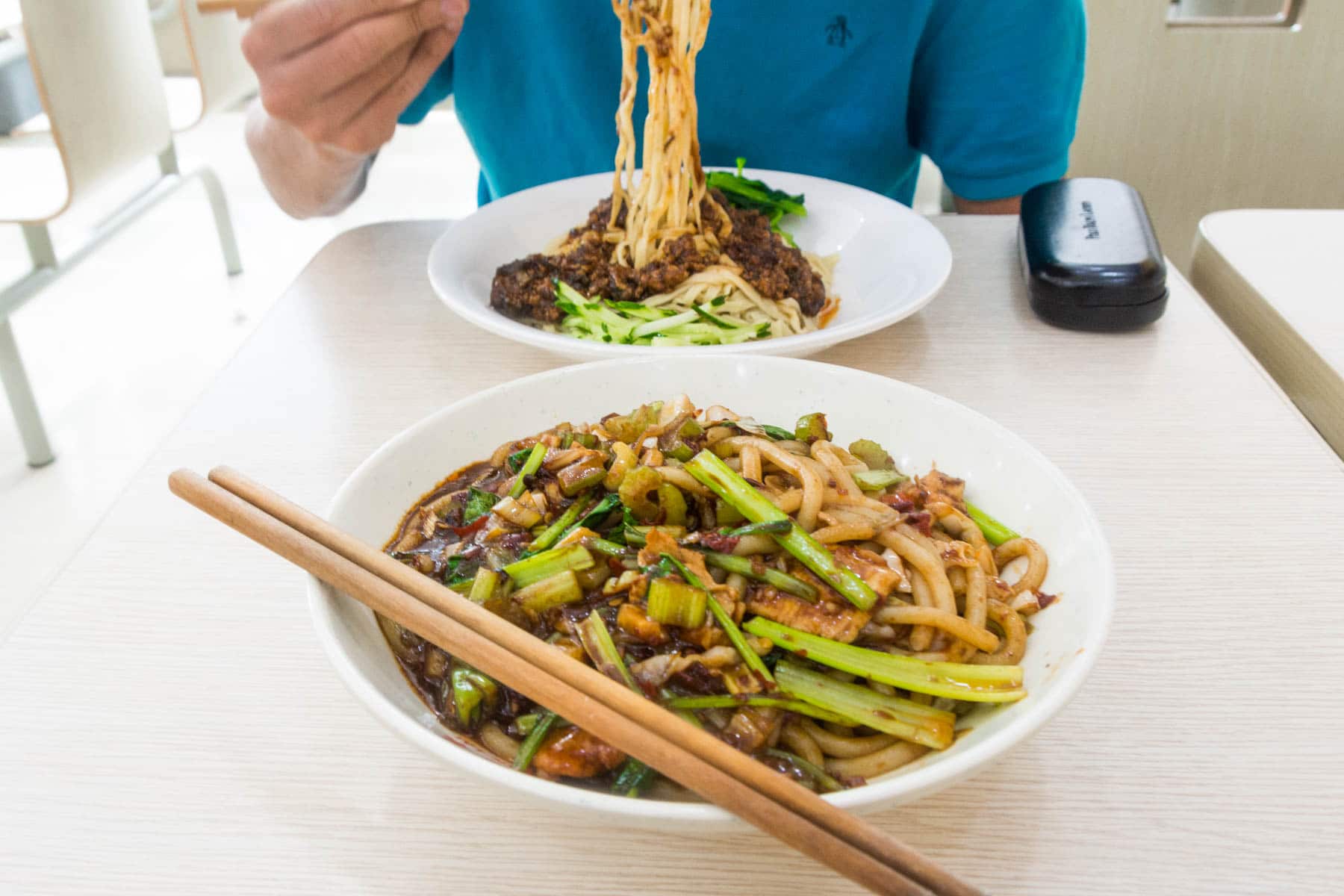
Yeah baby.
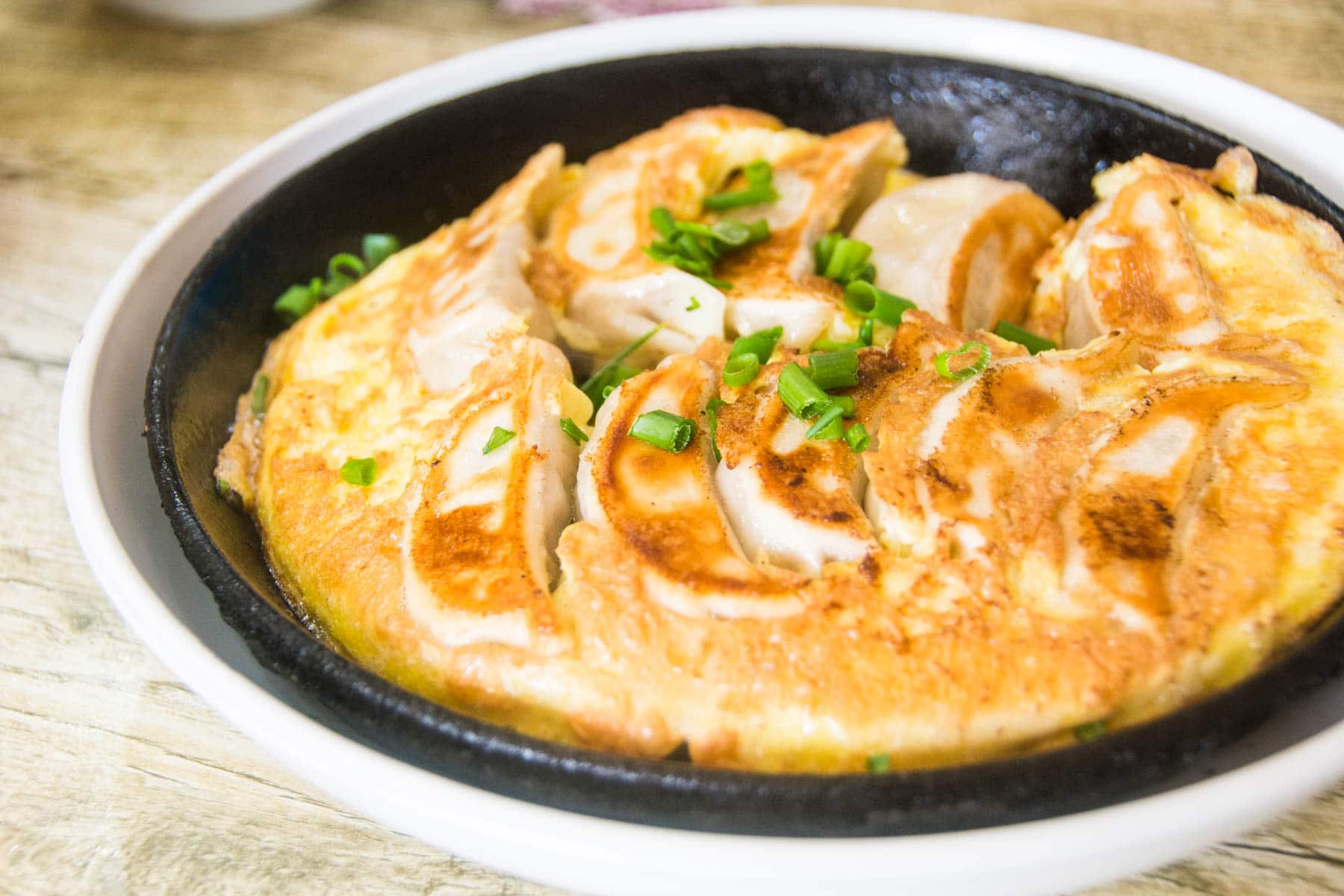
The grand finale: EGGS. AND DUMPLINGS. ALL AT THE SAME TIME.
At least we can say we left China with contented bellies.
Heading to China soon. Check out this post on things to do in China.
Have you ever traveled to a country, only to leave disappointed? Which country? What happened?
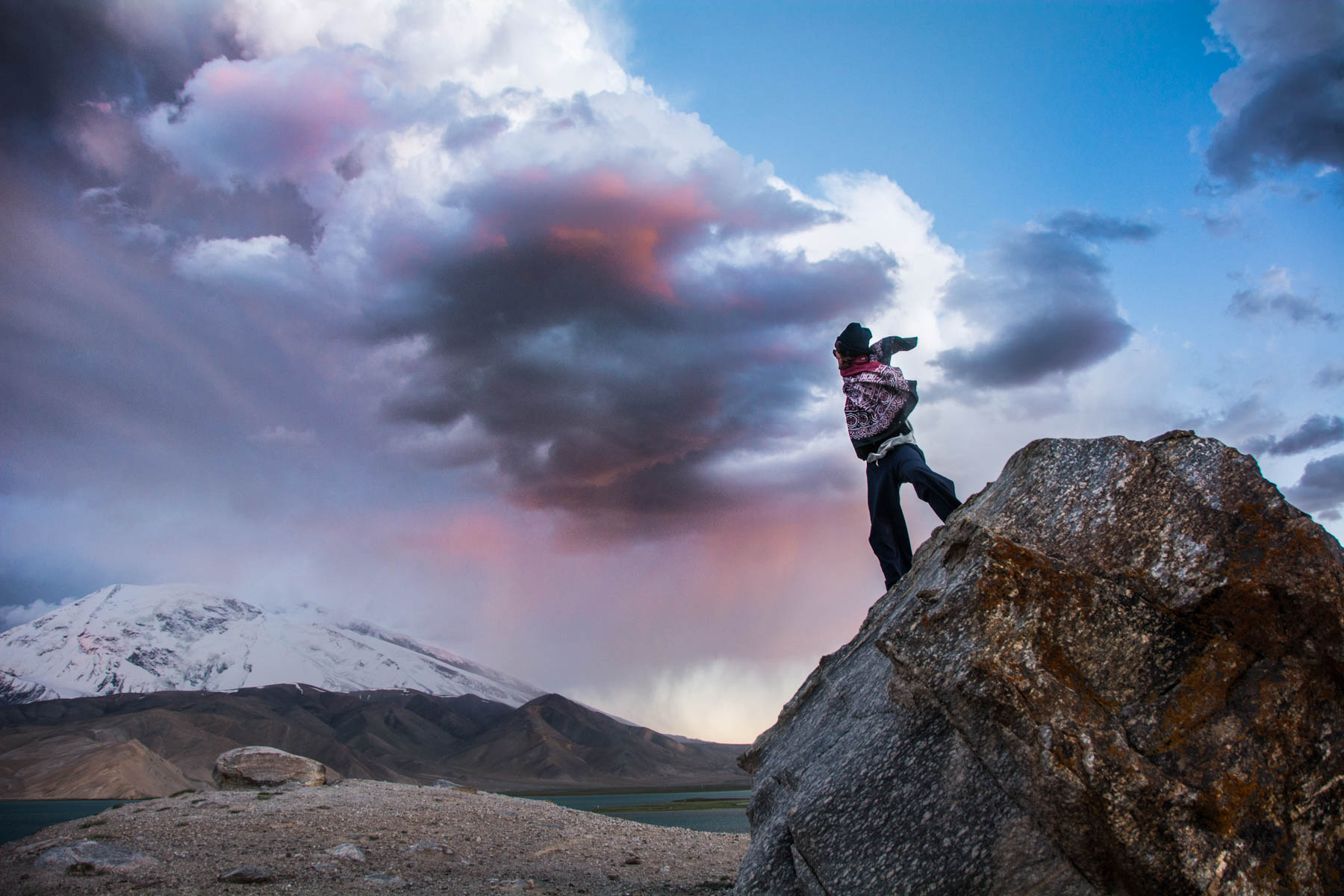
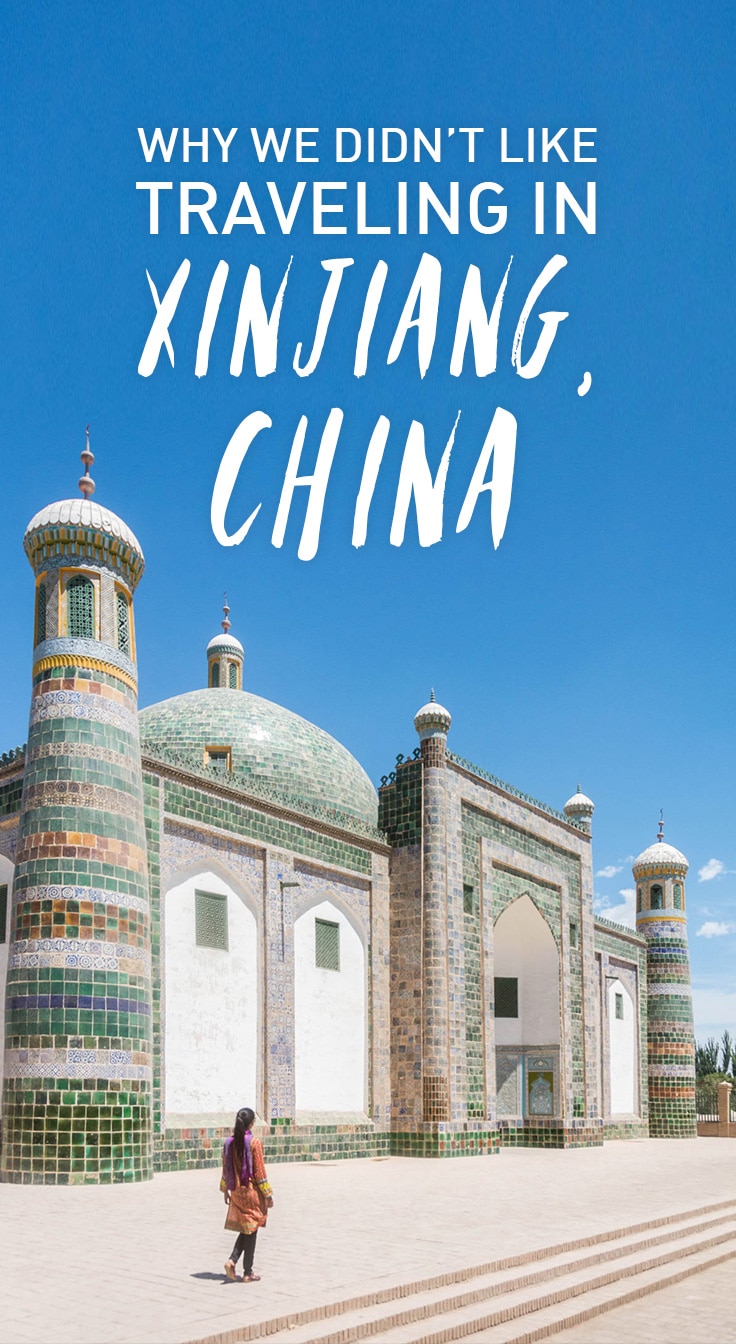


Dear all,
We are wasting an opportunity to explain freely what is happening in Xinjiang right now.
That’s the most interesting thing to visit that area.
Maybe we can understand why they are like this , why they charge to visit a mosque or how much they love the different languages..
Regards
Not really sure what you mean. If you’re talking about the political situation in Xinjiang, and the oppression of the local population, we are aware of that. But, this is not really the place to discuss that. Also, charging for sights is done by the government, and locals have very little say in this.
I think it’s really good what you told us about how it was in Xinjiang.
Most bloggers tell us only the good things, and that makes us (the readers) think that they have a perfect life!
But it isn’t always that perfect, you showed us.
Greetings,
Rianne
Haha we honestly don’t think a perfect life exists (although we’re pretty close). But we get what you mean. We often feel the same. Everything is rainbow and sunshine, apparently, but we know better. Trying to keep it real.
Hi,
Like the some of the above comments, I really hope you give China another chance and visit the east coast. Although the locals may sometimes seem rude and not overly friendly, they’re used to being that way to strangers they don’t trust and know. However, they are in general very polite people to those they do get to know, and also do the whole guerilla-warfare-over-paying-the-bill thing (similar to what you said in your 5 Serious Danger of Traveling to Pakistan article).
Hi Guys,
respect and congratulations to a very honest report of the impressions of your Xinjiang visit.
I am living in China for 7 years now and unfortunately what you guys describe as monitarization of nature and disneyfication is a common scheme in China everywhere (China is by far not a cheap country anyway).
But your destination is very different from the rest of China.
In Xinjiang suppression is taken very seriously. “Real” Uyghurs are living very isolated and are scared to go out, to work for example. They get arrested on the spot, if they only radiate the smallest possible threat.
There have been some serious local incidents when Uyghurs attacked Han Chinese randomly. The Chinese paranoia is not completely unfounded.
This is not a new thing, Xinjiang was (on/off) part of the Chinese empire for a few hundred years already. Uyghurs basically speak Mandarin very little to nothing, simply because of the minimal exposure to Han Chinese. The Han Chinese run the province. Many live there already for many generations and not all are fresh imports. Road blocks and controls on the road are frequent, Han are usually passing without any delay, Uyghurs and Laowais (foreigners) get grilled. Xenophobia at its best.
Interestingly Uyghurs have a special Chinese ID card, that does not permit them to leave the province without special documents they need to obtain.
Han Chinese in Xinjiang are heavily subsidised. Companies get huge incentives there. China has a big plan to develop this area to a tourist attraction (will take long time) and needs to explore the mineral wealth of parts of the province. In fact China is spending huge amounts of money for Xinjiang.
This extreme social and political environment does not reflect China generally.
It is very wrong to conclude that all of China is like Xinjiang.
Even the difference in “atmosphere” between north and south Xinjiang is already significant (as mentioned in one reply above correctly).
It would have been good to get a bit better overview in this biggest Chinese Province before coming out with stereotypes.
That’s too simple, guys!
Thanks for this long response. Not really sure what your point is, though. We mention most of the points you make, albeit in passing (this is a travel blog after all, and not a political one). We also link to an article about Uyghur oppression for people who want to learn more. We also mention that Xinjiang is different from the rest of China, and shouldn’t be compared as such. So unlike your claim, we don’t conclude that all of China is like Xinjiang.
You say we come out with stereotypes, but where exactly are the stereotypes? That Chinese officials are mindless drones? Pretty sure this holds true anywhere in China, as both expats and other travelers have told us.
In the end, this blog is about our experiences. We’ve met several people who had a completely different experience in Xinjiang from us, which us great. And they can write about those experiences on their own blog or in their own diary. But if we have a certain experience somewhere, we’ll write about it as we see fit, as we have done here.
Hi Sebastiaan,
thank you very much for this honest story! We have been to Xinjiang about 4 weeks ago and we also experienced the mindboggling amount of regulation and police control as really annoying! (We were there during the 19th party congress so everything was even more tight) Overall though, we had a great experience, especially down the Karakoram Highway and hiking in Tianchi.
We have to also agree with the other commentators that once you leave Xinjiang, things change radically! Ok, the Disneyfication of tourist attractions still continues but you can normally evade those. We were especially fond of Gansu, right next to Xinjiang, not sure if you had the chance to go? I would be very happy if you checked out our blog where we detailed some of our journeys!
Best,
Kevin and Nicole
Being in China during the party congress must have been something. Can imagine security is super tight. Yeah the KKH is gorgeous, we traveled most of it from Pakistan into China, definitely a highlight.
We didn’t go to other parts of China, since we headed to Central Asia instead.
Why do you see the world as your playground for the benefit of your easy travel and fun? You have little respect in your writing for cultures that are unlike your own. Your white privilege shows deeply, would hope you challenge yourself to stop believing that a place is unlikable when not fit for white western tourists.
Easy travels? You clearly haven’t looked around the site much, have you? Also not sure how me being white has anything to do with the arguments I make, or where I’m disrespectful towards Chinese culture. And who says that Xinjiang is unfit for western tourism? I certainly haven’t. If anything, its been made too fit, too sterile, you know, Disneyfied. If you don’t like the points I’m making, maybe come up with some actual arguments next time, instead of crying white privilege when you don’t agree.
Hi guys, just stumbled across your site. Very cool travels. My boyfriend at the time (now husband) and I travelled through Western China, Pakistan and onto India back in 1986. I think it was the 2nd summer the Karakoram highway was open. I’m of Chinese descent (grew up in Canada) and found the Uighurs to be extremely friendly when we were there. Of course there were far fewer Han Chinese living in that region and very little Chinese military presence in the area at the time. I think I would be saddened by the changes that have occurred over the last 30 years and would probably be concerned about how open the Uighurs would be to interacting with me.
Looking forward to reading more of your travels. Hope you two continue exploring the world. My husband and I have continued to travel on and off even with our 4 kids over the years. When they were younger we took them through Southeast Asia; in their early teens it was South America. As they moved away for university we continued to travel with whomever was available. Last year it was Ethiopia and the Caucasus. This summer my 22 year old and I are planning kyrgyzstan and tajikistan and the Afgan Wakhan corridor. However since I just read your article on the World Nomad games I’m starting to rethink our timing and thinking we should try and plan our travel around the games in September. Keep up the great reads!
This was the dumbest thing ive ever read. You didnt like a place because sights cost money and the people didnt treat you like royalty? Jesus Christ man. Your complaints are valid for the rest of China as well. Disneyfication? Check out Lijiangs ‘old town,’ or the ski lift up Snow Mountain. Maybe you should’ve read up up what makes Xinjiang special in the first place before going.
Thanks for reading. And thanks for the compelling case you make to visit the rest of China.
Very much enjoying your response to Rick’s enlightened comment.
Hi. We are traveling to Urumqi this year and want to know more about this city and it’s people. Any other pros and cons to offer in getting there, places to see and stay etc. will have four short days (after arriving at their airport) to be in Urumqi and want to make the most of it.
Safe travels,
TheOtherDonald
Hi Alex, I have read your blog all night and accidentally cross this article. I am a Chinese born and raised so it is hard for me not to read it when I see the title. I am glad you love the food, as Chinese food is always something I miss about when I travel around the world. I have never been to the parts you have visited, but I can feel your pain and frustration. I wont say people there are rude and unfriendly, but sometimes it happens especially in the touristic area, and I feel frustrated sometimes traveling to other parts of the country as well. Many people have left China because the general environment there is not good for us and our next generations as well. We love our country but we cannot do anything with our government. If you visit other parts of China where people speaks English, you will feel easier. It has changed a lot over the years so hopefully you will get a chance to explore the remaining parts.